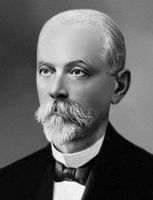Dmitri Iosifovich Ivanovsky (alternative spelling Dmitrii or Dmitry Iwanowski; Russian: Дми́трий Ио́сифович Ивано́вский;[a] 28 October 1864 – 20 June 1920) was a Russian botanist, the co-discoverer of viruses (1892), and one of the founders of virology.[1][2][3][4][5]
Dmitri Ivanovsky | |
|---|---|
 Ivanovsky, c. 1915 | |
| Born | 28 October 1864 |
| Died | 20 June 1920 (aged 55) |
| Nationality | Russian |
| Alma mater | St. Petersburg Imperial University |
| Known for | Discovery of viruses, Tobacco mosaic virus |
| Scientific career | |
| Fields | Virology |
| Institutions | St. Petersburg Imperial University Imperial University of Warsaw Saint Vladimir Imperial University of Kiev Donskoy University |
| Doctoral advisor | Andrei Famintsyn |
Life

Ivanovsky was born in the village of Nizy, Gdov Uyezd. He studied at the University of Saint Petersburg under Andrei Famintsyn in 1887, when he was sent to Ukraine and Bessarabia to investigate a tobacco disease causing great damage to plantations located there at the time. Three years later, he was assigned to look into a similar disease occurrence of tobacco plants, this time raging in the Crimea region. He discovered that both incidents of disease were caused by an extremely minuscule infectious agent, capable of permeating porcelain Pasteur-Chamberland filters, something which bacteria could never do. He described his findings in an article (1892)[6] and a dissertation (1902).[7] Then he worked at the Imperial University of Warsaw and at Donskoy University in Rostov on Don.
In 1898, the Dutch microbiologist Martinus Beijerinck independently replicated Ivanovsky's experiments and became convinced that the filtered solution contained a new form of infectious agent, which he named virus. Beijerinck subsequently acknowledged Ivanovsky's priority of his discovery of the submicroscopic entity that was filterable.[2]
Notes
References
Sources
External links
Wikiwand in your browser!
Seamless Wikipedia browsing. On steroids.
Every time you click a link to Wikipedia, Wiktionary or Wikiquote in your browser's search results, it will show the modern Wikiwand interface.
Wikiwand extension is a five stars, simple, with minimum permission required to keep your browsing private, safe and transparent.
